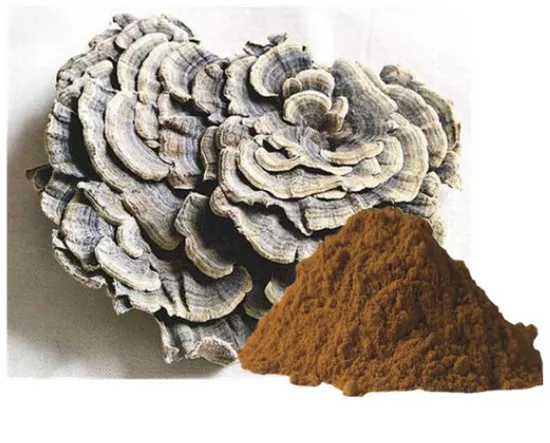Turkey Tail Mushroom for Dogs Side Effects: A Comprehensive Guide
While turkey tail mushroom is touted for their immune-boosting properties, you need to know the potential side effects before adding them to your dogs' diet.
Here’s a full guide to the risks of turkey tail mushrooms for dogs.
As natural supplements become more mainstream in dog care, turkey tail mushrooms have become super popular due to their health benefits, including cancer-fighting properties and immune support.
But like all supplements, they aren’t risk-free. Knowing the side effects and how to introduce turkey tail mushrooms to your dog safely can prevent health problems.
In this article, we’ll go into the side effects of turkey tail mushroom for dogs, how to minimize risks, and everything else you should know.
Disclaimer: This article is intended for informational purposes only and does not constitute medical advice. Always consult your veterinarian for diagnosis and treatment of any health concerns regarding your pet.
Introduction

Turkey tail mushroom (also known as Trametes Versicolor), are a medicinal mushroom used for immune support.
Many dog owners have turned to these mushrooms for their dogs, hoping to boost immunity or complement cancer treatment, but you need to know the potential side effects that come with them.
In this article, we’ll go into the side effects so you can make an informed decision if turkey tail mushrooms are right for your dog and how to introduce them safely without harming your dog.
What is Turkey Tail Mushroom?

Turkey tail mushroom is a type of fungus used in Japanese and traditional Chinese medicine for their medicinal properties; it is known as one of the medicinal mushrooms. They look like a fan, hence the name Turkey Tail. Aside from that, phytonutrients in Turkey Tail mushrooms contribute greatly to the overall health of our beloved pets.
Humans have been using them for centuries, but they’ve recently become popular in veterinary medicine for their ability to boost dog immunity, fight infections, and even slow down cancer. In today's world, we are now seeing Turkey Tail Mushroom Supplements as medicinal mushrooms for our beloved pets. But with these benefits come risks and side effects.
Health Benefits of Turkey Tail Mushroom
Before we get into the side effects let’s look at the benefits that make turkey tail mushrooms appealing to pet parents as medicinal mushrooms:
- Dog's Immune System Support: Turkey tail mushrooms are full of polysaccharides like PSK and PSP that stimulate the immune cells, as well as the overall immune system.
- Cancer-Fighting Properties: Studies show they can improve survival rates in dogs with cancer, especially those undergoing chemo.
- Gut Health: They’re prebiotic, meaning they feed the good bacteria in your dog’s gut for overall digestive health.
While these benefits are great, they come with risks, which is why you need to know the side effects.
Full Side Effects of Turkey Tail Mushroom for Dogs

Turkey tail mushrooms are generally considered safe but some dogs may experience side effects especially if the mushrooms are not introduced properly or if given in high doses. Let’s get into the most common side effects your dog may experience for this medicinal mushrooms.
Digestive Issues
One of the most common side effects of turkey tail mushroom supplement in dogs is digestive upset especially when the supplement is introduced too fast or in high doses.
- Diarrhea: Your dog’s digestive system may not be able to process turkey tail mushrooms and you may see loose stools or diarrhea. This is more likely if you give the mushrooms in large amounts or if your dog is sensitive to new supplements.
- Vomiting: Some dogs may experience nausea and vomiting when they first start taking turkey tail mushrooms. If your dog vomits after taking the mushroom, it’s a sign that their system can’t tolerate the supplement well.
How to Minimize This Risk: Start with a small dose and gradually increase. This allows your dog’s digestive system to adjust to the new mushroom supplements. Mixing the mushroom powder with food can also help reduce stomach upset.
Allergic Reactions
While rare, some dogs may be allergic to turkey tail mushroom supplements, and can exhibit various allergic reactions.
- Symptoms of Allergies: Allergic reactions can include itching, hives, swelling (especially around the face or paws), difficulty breathing, or gastrointestinal upset. In extreme cases, anaphylaxis—a severe life-threatening allergic reaction—can occur.
- What to Do: If you see any signs of an allergic reaction stop using immediately and consult your vet. Antihistamines or steroids may be needed to manage the reaction.
How to Minimize This Risk: Before giving your dog a full dose of organic turkey tail mushrooms test with a very small amount and monitor for any signs of allergies.
Liver Strain
Turkey tail mushrooms are metabolized by the liver so if your dog has pre-existing liver issues or is on medications that affect liver function the mushroom could put extra strain on their liver.
- Liver Toxicity: Although rare, excessive use of turkey tail mushrooms can cause liver strain, especially in dogs with liver disease or dysfunction.
- Symptoms: Signs of liver strain or toxicity include lethargy, yellowing of the eyes or skin (jaundice), loss of appetite, and dark urine.
How to Minimize This Risk: Always consult your vet before giving your dog turkey tail extract especially if your dog has liver problems. Your vet may recommend blood work to monitor liver function during supplementation.
Impact on Dogs With Pre-Existing Conditions
Dogs with autoimmune diseases or on immunosuppressive therapy should be cautious with turkey tail mushrooms, especially those that has cancer cells on it.
- Immune Stimulation Risks: Since turkey tail mushrooms or turkey tail extract stimulate the immune system they may exacerbate autoimmune diseases or interfere with immunosuppressive treatments. This can lead to increased inflammation or other complications in dogs with conditions like lupus, immune-mediated hemolytic anemia, or Addison’s disease.
How to Minimize This Risk: If your dog has an autoimmune condition talk to your vet about turkey tail supplementation to avoid exacerbating the condition.
Long-Term Use and Potential Risks
While turkey tail mushroom extract are used for short-term benefits long-term, even for cancer cells use may have effects that aren’t immediately apparent.
- Immune System Overstimulation: Long-term use of immune-boosting supplements can cause the immune system to become overactive. This could potentially lead to chronic inflammation or autoimmune reactions in susceptible dogs.
- Tolerance Build-Up: Like many supplements, there’s a chance that over time your dog’s body may become less responsive to the benefits of turkey tail mushrooms and they may become less effective.
How to Minimize This Risk: If your dog has been using turkey tail mushrooms long term work with your vet to monitor their overall health and adjust dosages as needed to prevent long-term issues.
How to Introduce Turkey Tail Mushroom Safely

Introducing any new supplement to your dog’s diet should be done gradually and with caution. To minimize the risk of side effects follow these steps:
- Start Slow: Start with a smaller than recommended dose to allow your dog’s body to adjust. This will allow you to see any early signs of digestive upset or allergic reactions.
- Mix with Food: Mixing the mushroom powder with food can make it easier for your dog to digest and can prevent stomach issues.
- Monitor for Symptoms: During the first few weeks monitor for any signs of digestive upset, allergies, or lethargy. If side effects occur stop giving the supplement and consult your vet.
Dosage Guidelines for Turkey Tail Mushroom

Dosage will depend on your dog’s weight and health condition. Always start with the lowest recommended dose and adjust as needed:
- Small Dogs: 1/8 to 1/4 teaspoon per day
- Medium Dogs: 1/4 to 1/2 teaspoon per day
- Large Dogs: 1/2 to 1 teaspoon per day
If using capsules or tinctures follow the manufacturer’s dosage instructions as potency can vary between products.
Recognizing and Treating Adverse Reactions

It’s important to recognize the side effects early to prevent further complications. Here’s what to look out for:
- Diarrhea or Vomiting: These are the most common signs that your dog isn’t tolerating the supplement well. If symptoms persist for more than 24 hours stop the supplement and consult your vet.
- Lethargy: Unexplained tiredness can be a sign that your dog’s body is having trouble processing the supplement or the immune-stimulating effects are too strong.
- Allergic Symptoms: Swelling, itching, or hives can be a sign of an allergy. Stop use immediately and consult your vet.
If any of these symptoms occur reduce the dose or stop the supplement and consult your vet.
Should You Use Turkey Tail Mushroom? When to Avoid Them
Turkey tail mushrooms can be a great supplement for many dogs especially those with weakened immune systems or undergoing cancer treatment. But they aren’t for every dog.
When to Avoid Turkey Tail Mushrooms:
- Dogs with Autoimmune Diseases: The immune-stimulating properties of turkey tail mushrooms could exacerbate autoimmune conditions.
- Dogs with Liver Disease: The supplement could put extra stress on the liver, especially in dogs with liver dysfunction.
- Allergic Dogs: If your dog has a history of food allergies introduce the mushrooms with caution and stop use at the first sign of an allergic reaction.
Consult Your Vet Before Use

Before giving your dog turkey tail mushrooms consult your vet. Your vet can determine if turkey tail mushrooms are safe for your dog based on their health history and any medications they are on.
Your vet may also recommend a specific dosage and schedule for turkey tail supplementation to ensure your dog gets the benefits without the side effects.
Conclusion

Turkey tail mushrooms are great for dogs, especially in supporting the immune system and cancer treatment.
However, side effects can occur if introduced too quickly or in large doses. Common side effects are digestive upset, allergic reactions, and in some cases liver stress.
To be safe always start with a low dose, monitor your dog, and consult your vet before adding turkey tail mushrooms to your dog’s diet. By doing so you can ensure your dog gets the benefits without the side effects.
FAQs
1. Can all dogs take turkey tail mushrooms?
Most dogs can but dogs with autoimmune diseases, liver conditions or allergies may not be good candidates. Always consult your vet first.
2. What are the signs of an allergic reaction to turkey tail mushrooms?
Itching, swelling, hives, difficulty breathing. Stop the supplement and consult your vet if these occur.
3. Can turkey tail mushrooms damage the liver in dogs?
In dogs with pre-existing liver conditions turkey tail mushrooms could add stress to the liver. Consult your vet if your dog has liver issues.
4. What if my dog gets diarrhea after taking turkey tail mushrooms?
Stop the supplement. If the diarrhea persists consult your vet.
5. Can I over dose my dog with turkey tail mushroom?
Yes, giving your dog too much of any supplement can cause digestive upset or other problems. Follow the recommended dose and consult your vet.




